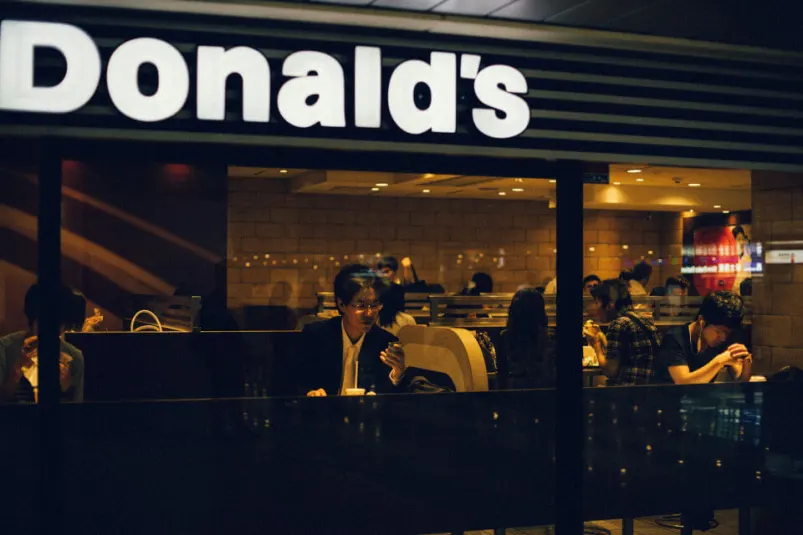Green economy: What happened to McDonald's sustainability plans?

Sustainability has arrived in places that have long smelled of plastic, burger buns and cold chains. Today, large corporations such as McDonald's present themselves as attentive environmental players, as co-creators of a greener future.
The only question is how much substance there is behind this self-positioning. There is often a fine line between PR offensive and actual change and this line is often clearly crossed.
What McDonald's announced at the Green Week in Berlin
When a global fast food giant pitches its tents at the Green Week in Berlin, there is more to it than image cultivation with cows and sacks of potatoes. McDonald's served up ambitious promises at the trade fair in addition to fries in 2025. Cooperation with German farmers was demonstratively emphasized, including the fact that around 65% of the raw materials used now come from Germany. This is intended to strengthen regional economic cycles and also make supply chains more climate-efficient.
In addition, an expanded commitment to animal welfare was announced, a topic that has been at the center of social debate for years. The “BEST Beef” initiative was presented, as was the new collaboration with the “Initiative Tierwohl” (Animal Welfare Initiative). The company also said that it wanted to make further changes to its packaging, making it more sustainable, more functional and as plastic-free as possible. The goal is fast food that no longer has to justify itself purely on the basis of convenience, but instead sells itself as a responsible meal.
What sounds like progress is coherent on paper. But the crucial question remains: how much of this actually ends up in the everyday lives of restaurants?
Packaging, recycling and reusable packaging: what has really changed in the stores
It's paper bags instead of plastic bags, wood instead of plastic and reusable instead of disposable, at least in the product catalogs. McDonald's has set itself ambitious goals and aims to have all packaging worldwide made from renewable, recycled or certified materials by 2025. In Germany, this goal has already been partially anticipated. Paper-based sales packaging has been made from sustainable sources since 2015. The plastic lids on cold drinks have been replaced with paper solutions in many stores, salads are served in cardboard boxes instead of plastic bowls and desserts are served with wooden spoons.
However, the implementation of these measures is not a sure-fire success and is not the same at all locations. In particular, the issue of reusable containers, which has become more of a focus due to legal requirements since the beginning of 2023, shows the discrepancy between theory and practice. Although reusable cups and containers are already available in selected restaurants, according to environmental associations, the actual implementation rate is well below expectations. Some speak of less than ten percent nationwide coverage. A figure that falls far short of ambitions.
The will to change is there, but implementation often fails due to logistical hurdles, a lack of training or simply the effort involved, yet some noticeable changes can already be seen at McDonald's:
What specifically has changed in the branches:
- Sales packaging consists of paper fibers from sustainable sources (status: Germany since 2015).
- Switch from plastic spoons to wood for desserts such as McFlurry® and Sundae®.
- Introduction of cardboard packaging for salads and other side dishes, reduction of plastic lids.
- Test operation of reusable cups and trays in selected restaurants, cooperation with deposit partners.
- Use of anti-littering campaigns and local campaigns to raise awareness among guests.
Such measures seem promising at first glance, but a second look reveals that while individual steps are being implemented, the big picture is still a long way off.
How credible is McDonald's sustainability promise really?
Even ambitious measures lose their shine if they are not implemented consistently or if they are exaggerated in advertising. This is exactly what Deutsche Umwelthilfe accused McDonald's of in 2023. The accusation is greenwashing.
The company's “I am beautiful” campaign was awarded the unflattering “Golden Vulture”, a negative prize for the most audacious environmental lie of the year. The reason for this is that McDonald's advertised that it was doing away with plastic straws and failed to mention that the new paper straws were nevertheless coated with plastic.
An incident that shows how thin the air becomes when advertising, promises and reality drift apart. Sustainability cannot be thought of in terms of campaigns, but must be proven in everyday life, especially in a company that serves millions of guests every day.
Unsurprisingly, McDonald's has hardly commented publicly on the criticism. While there is certainly internal reflection on how this could have happened, the public impression remains ambivalent. The will to change is visible, but evidence of real consistency is often still lacking.
Animal welfare, milk and meat - what's behind it?
Sustainability does not start with the cardboard straw, but where animals are kept, fed and slaughtered. In this respect, things get a lot more complex for a company like McDonald's, because anyone who processes millions of tons of beef, pork and poultry every year has to be measured against more than just PR targets.
In this context, McDonald's likes to refer to its “BEST Beef” program, a project that works with selected farmers to improve the husbandry, health and feeding of cattle. It's all about the climate in the barn, exercise areas and animal welfare checks. Whether this is enough to meet the expectations of modern animal husbandry remains a matter of opinion. What is clear is that it is a step in the right direction, but definitely not a radical change.
More exciting is joining the “Animal Welfare Initiative”, an industry project that brings supermarkets and food service providers together. The aim is to define minimum standards for pig and poultry farming that exceed the legal requirements. In McDonald's terms, this means that pork and chicken products are gradually being converted to ITW-certified goods. The changeover is underway, but is not yet complete.
The company also wants to score points with milk, as McFlurry®, McSundae® and shakes will only use milk from farming method 3 from 2025. This at least meets a standard that goes beyond the legal minimum, but here too, anyone thinking of a romanticized farm idyll is likely to be disappointed, because farming method 3 does not mean free-range or organic, but merely an improved barn climate, more space and a little more light.
Transparency is the keyword that can be used to summarize these developments. McDonald's is endeavoring to disclose the origin and production conditions, not completely, but with visible progress.
Changing consumer behavior and new expectations
A lot has changed in society. Sustainability has long been a strategic obligation, especially in the food service industry. Consumers are making more conscious decisions today. They ask about animal welfare, supply chains, carbon footprint and demand verifiable transparency.
It has been observed that many people do not buy the full range of organic products straight away, but instead test, compare and try them out first. The introduction to more sustainable consumer behavior often takes place via small, low-threshold impulses. A vegan burger here, a taster snack there. New products end up in the shopping cart because they arouse curiosity, not because they are supposed to change your own shopping behavior.
In precisely this context, free samples are sometimes available at Mein-Deal.com to facilitate such tests. Whether vegan alternatives, new drinks or sustainable cosmetics, platforms like these help people to try out new products risk-free. People who test something for free are more willing to question their habits and this test impulse often has a more lasting effect than any advertising campaign ever could.
McDonald's has also recognized this. More and more often there are promotions with new products and these are vegan, vegetarian or simply rethought. The threshold for choosing something different is falling. The effect is that awareness is slowly changing, not being imposed. Consumption as a learning process works if the right conditions are in place.
How McDonald's compares to the competition
While some fast food chains are largely staying out of the debate, others in the food & drink sector are focusing on their sustainability initiatives. Subway, for example, focuses on local freshness, while Burger King regularly promotes plant-based alternatives. Vapiano has also set an example in terms of reusable and refill systems.
McDonald's is somewhere in between, with a clear direction but sometimes shaky implementation. The indications of origin and partnerships with local agriculture speak for a solid foundation. The breadth of the sustainability measures also seems well thought out, but there is a lack of reliability, because what works well in a large city branch is sometimes barely noticeable in a rural drive-in station.
The attempt to score points with logistics advantages is exciting. Through standardized processes and global reach, McDonald's could scale sustainability in a dimension that is denied to many competitors, but size is an obligation and this also means that promises must be more than PR goals.
Sustainability as an ongoing task
Sustainability is a process and this process requires perseverance. Those who change their packaging and set up animal welfare programs today will be challenged on other fronts tomorrow. Carbon footprints, resource conservation, employee training and waste separation are all part of the overall picture.
For McDonald's, this means that PR campaigns can create momentum, but they must not be empty promises. Credibility depends on concrete progress, not on fine words at trade fairs. What counts is consistency in purchasing, logistics and in the restaurants.
It is clear that not every process runs smoothly. Logistics partners have to be changed, employees have to be trained and processes have to be reorganized, but the decisive factor is the direction and here it is clear that the course is right, even if the pace still leaves something to be desired.
It is also important to think of sustainability as part of the corporate culture, not as a department or project. This interview with Antje von Dewitz shows that only when ecological responsibility is anchored in a company's DNA will it become a matter of course and that is precisely what will determine whether McDonald's is perceived as a serious player in the future.
Green paint or real change? The balance remains ambivalent
The question remains as to whether McDonald's is a pioneer on the way to more sustainable system catering or just a clever free rider? An important question, as McDonald's is pursuing major expansion plans in Germany until 2027.
However, the answer so far has been ambivalent. There has been progress, no question. Packaging has been changed, new animal welfare standards have been introduced and partnerships with farmers have been strengthened. The direction is right, the commitment is visible.
However, progress is offset by mixed implementation. Not every measure reaches all locations. Not every claim is lived consistently and not every green advertising message stands up to reality.
Whether the green paint job turns into a sustainable transformation is not decided at Green Week or in PR campaigns, but in everyday life. The biggest challenge lies in making sustainability a matter of course and this is exactly what McDonald's will have to measure itself against in the coming years.

Berlin Poche
Editorial Team
Always looking for new addresses, we like to share our discoveries and make you discover the best places in Berlin.